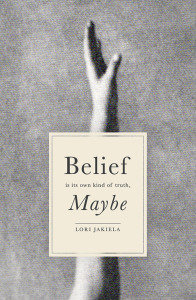
Lori Jakiela's Belief Is Its Own Kind of Truth, Maybe may be acclaimed as a work that explores adoption, but a closer look reveals that Jakiela's book is much more. In her newest book, Jakiela intertwines her story of looking for her birth mother with explorations of her relationship with the mother who raised her and her own personal struggles with motherhood.
Jakiela starts off her book with a simple statement that sets the tone for her story: "When my real mother dies, I go looking for another one. The Catholic Charities counselor's word for this other mother I want after decades to find is biological. Illegitimate is another word for people who end up like me. It's what I feel now, unlawful, unauthorized, unwarranted her in this office that smells like antiseptic and rubber gloves, hot teeth drilled down to the bone."
From this first paragraph, we are introduced to several important components of the book. Jakiela is not just feeling the loss of her mother, she is feeling a loss of herself, and she believes that looking for her biological mother is a step in regaining part of her personal identity that seems muddled and foggy (at least in her viewpoint). This is not what she tells the counselor, however. Instead, she says that she is looking for a medical history.
What follows is a braided story. First, Jakiela chronicles her journey towards finding her biological mother. Second, she retells stories that highlight her relationship with the couple who adopted her. Finally, she relays her own frustrations (and joys) of being a working wife and mother.
Readers who are new to Jakiela's work may find the nonlinear progression of her journey a little confusing, yet, I believe that many people who find this book are already familiar with many of the characters introduced in Jakiela's two previous memoirs, Miss New York Has Everything and The Bridge To Take When Things Get Serious. My advice to those who are new to the writing of Lori Jakiela: read Belief Is Its Own Kind of Truth, Maybe and then read her two other memoirs. I will bet you will return to Jakiela's newest memoir with a deep appreciation of the delicate way that she balances humor with her depictions of love, in its rawest, yet purest forms.
For more information about this book, see Atticus Books. Lori Jakiela also keeps a blog where she explores many of the same themes found in her memoirs.
Jakiela starts off her book with a simple statement that sets the tone for her story: "When my real mother dies, I go looking for another one. The Catholic Charities counselor's word for this other mother I want after decades to find is biological. Illegitimate is another word for people who end up like me. It's what I feel now, unlawful, unauthorized, unwarranted her in this office that smells like antiseptic and rubber gloves, hot teeth drilled down to the bone."
From this first paragraph, we are introduced to several important components of the book. Jakiela is not just feeling the loss of her mother, she is feeling a loss of herself, and she believes that looking for her biological mother is a step in regaining part of her personal identity that seems muddled and foggy (at least in her viewpoint). This is not what she tells the counselor, however. Instead, she says that she is looking for a medical history.
What follows is a braided story. First, Jakiela chronicles her journey towards finding her biological mother. Second, she retells stories that highlight her relationship with the couple who adopted her. Finally, she relays her own frustrations (and joys) of being a working wife and mother.
Readers who are new to Jakiela's work may find the nonlinear progression of her journey a little confusing, yet, I believe that many people who find this book are already familiar with many of the characters introduced in Jakiela's two previous memoirs, Miss New York Has Everything and The Bridge To Take When Things Get Serious. My advice to those who are new to the writing of Lori Jakiela: read Belief Is Its Own Kind of Truth, Maybe and then read her two other memoirs. I will bet you will return to Jakiela's newest memoir with a deep appreciation of the delicate way that she balances humor with her depictions of love, in its rawest, yet purest forms.
For more information about this book, see Atticus Books. Lori Jakiela also keeps a blog where she explores many of the same themes found in her memoirs.
 RSS Feed
RSS Feed
